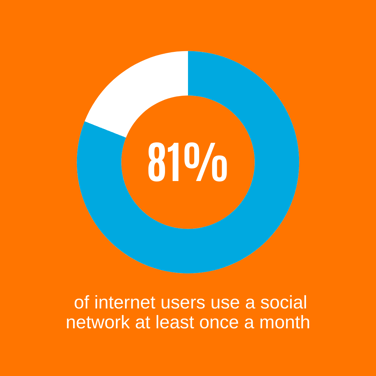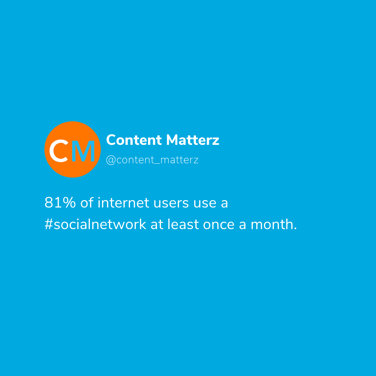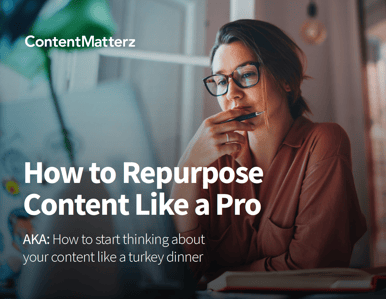How To Repurpose Content Like A Pro
AKA: How to Start Thinking About Your Content Like a Turkey Dinner
Free Download
A Complete Guide to Making the Most Out of Your Marketing Content
And What Turkey Dinners and Content Marketing Have in Common.
Learn More
The content machine needs to be constantly fed – so serve up a turkey* dinner! This is your one-stop guide to repurposing content, complete with why you should do it, how you should do it, and plenty of delicious examples.
Reader’s beware: this guide will make you hungry – for content! Or turkey. Or both.
*note: no turkeys were harmed in the making of this guide.
Let's start with a few definitions
And what does it mean to repurpose content? Let’s start with the basics:
-
Content is “everything your customer or prospect touches or interacts with – including your own online properties and web pages and the experiences they offer, but also everything on any social channel (like Instagram, Twitter, Facebook, LinkedIn, YouTube, and so on).”1
So yeah, pretty much everything. That’s why people in the industry say that content is king (but don’t say that. It’s cliché). In 2022, the world is expected to create, capture, copy, and consume 94 zettabytes. That's a lot of content.
-
Content repurposing, also called content recycling, is taking existing content and turning it into a different format.
1. Ann Handley’s definition in her book Everybody Writes
Who should repurpose content?
You! Everyone! Your neighbor with the blog about her cats! You’ve all got enough on your plates, but that content machine is forever hungry (just leave now if you can’t handle our food puns; we can’t stop). Let a piece of content you’ve already created have a second, third, or fourth life with a new format. Trust us, it’ll do the body (ok, your business) good.
Why you should repurpose content
Content repurposing is often done to extend the reach and lifespan of a piece of content. But there are plenty of other good reasons to repurpose your content. Let’s take a look at the benefits:
1. Save your time and money
You have a million and one things to do today, but only a few hours to get it done. In fact, 60% of marketers say their time is spent on low-value or unnecessary tasks, including searching for information. Instead of wracking your brain for new content ideas, focus on getting the content you already have into the hands of more people by switching up the format. And as they say, time is money!
2. Get found
There are more than 5 billion internet users worldwide in 2022, and getting their attention takes some skill. Publishing more content boosts your online presence and can improve your SEO. With more content, search engines are more likely to view your website as a credible and valuable source for users. This means you’re more likely to rise the ranks and end up in the top results.
3. Beat writer’s block
Creative juice running low? We’ve all been there. And yet, unfortunately, we can’t afford a kink in the content machine. Get things flowing by starting somewhere familiar and see where it takes you.
4. Reinforce your message
Marketing’s Rule of 7 says your customer needs to hear your message seven (!) times before they buy. Be a rule follower. Get your message out in new ways by repurposing content so it can eventually sink in.
5. Reach new audiences
Cue the voice of your Marketing 101 professor telling you to “meet your audience where they are.” Repurpose content for different mediums so your audience can get what they’re looking for in the places they’re already looking.
6. Diversify your content
Not everyone learns in the same way or from the same source (see #5), but they all need to hear a consistent message from your brand (see #4). Offering your content in different formats will help you achieve these goals and make your brand more dynamic.
7. Extend what’s working
Got a piece of content with off-the-charts results? Take it and run with it (we’ll show you how below). Content repurposing also lets you breathe new life into old successes by presenting them to your customers in a new format.
8. Cover the buyer’s journey
One long-form piece of content can be repurposed into multiple, smaller pieces of content that target each of the buyer stages. Social media posts and blogs can be great for those in the awareness stage. An email campaign or case study examples might be best for those in the consideration stage. Finally, a case study can reel them into the decision stage.
9. Unify your sales and marketing teams
Get everyone marching to the beat of the same content drum. When your sales and marketing teams are both focused on the same message, you’ll build camaraderie while delivering a strong, unified campaign to your customers.
10. Refine your process
Practice makes perfect! Even if your team is a well-oiled machine, it’s always good to reinforce your process for content ideation, generation, and publishing. A good content repurposing exercise lets you put your versatility to the test and iron out any kinks across the broad spectrum of content types and platforms that you deploy for your marketing efforts.
The turkey dinner
We promised you in the title of this guide that content repurposing and turkey dinners have a lot in common. So, hear us out here.
Think about the last time you made a turkey dinner. You put a lot of effort into planning, preparing, and cooking said dinner. It took time, creativity, and money. But it was worth it because you served up a delicious, nutritious meal that was a smash hit – even Aunt Bea and Little Timmy ate it up.
Ok, now imagine your in-laws get to town the day after your turkey dinner success. You’re exhausted, you’ve got no time, and your grocery budget is tight, but they’re expecting a meal. So, what do you do? You repurpose that turkey dinner into new, delightful culinary experiences for the next three days. Today, it’s a turkey sandwich! Tomorrow, turkey and butternut squash soup. Maybe it even becomes a turkey pot pie.
And just like that, you’ve turned one turkey dinner for your family into a bunch of meals for your guests. Everyone’s satisfied and your status with the in-laws remains intact.
That, friends, is the power of repurposing.
Let’s get back to marketing
We think it’s time to show you how it’s done. We’ll walk through how to repurpose a long-form content offer into many short-form content offers. In the process, we’ll save you time and money and show you all those other benefits we mentioned earlier.
How to repurpose content
Choosing your turkey dinner
Let’s assume we’ve convinced you that you should repurpose content. But how do you actually determine which piece of content will serve as your turkey dinner?
We recommend starting with a meaty meal that’s already proven to be a satiating spread. In other, less food-related terms, start with a long-form piece of content like an eBook or whitepaper that’s already got stellar metrics. Previous success is a good indicator that this content will be valuable if repurposed.
You’ll want to determine your goals before deciding how you’ll repurpose that content. Maybe you want to reach new audiences. Or maybe your sales team needs new content for a certain leg of the buyer’s journey. Maybe you need to solidify yourself as a leader in your industry on the topic. Figure out what you need from this exercise and how it will help you achieve your marketing goals before you begin.
Remember!
You want to tell a cohesive story across all channels. The beautiful thing about a turkey dinner is you can keep your content on topic while iterating on the big ideas.
- Turn chapters into smaller eBooks
Break your long-form piece into smaller, bite-sized chunks. By separating out chapters of your eBook, or sections of your whitepaper, you are then able to serve them up as smaller individual eBooks to their appropriate audience. Consider adding new intros to each piece to really zero in on your target persona. Then, update your call to action at the end to make sure it’s moving them through to the next stage of the buyer’s journey.
- Create an email campaign
Set to grow to 4.6 billion users by 2025, email is still a very effective way to reach your target audience. Short, focused content that offers a solution or aids the recipients with an issue has the most impact. Use topics from your eBook as your guide and narrow down the content into emails for a campaign. For example, we could take each of the 10 reasons for repurposing content above and break them into separate emails. Each email could highlight how one of the reasons will impact the recipient (what's in it for them), and include a link back to this page to drive visitors to our website.
- Go deeper in blog posts
86% of B2B tech buyers say that blogs are quite or very influential when researching a new product or service for their company. That's because blogs give you an opportunity to dive deep into a topic. Use them as an opportunity to further educate your customer on a topic that may have only received brief mention in your whitepaper or eBook. And don't forget to add a link or callout so readers can download your original content offer!
- Make a slide desk
Include clickable calls to action and links to relevant blogs or landing pages throughout your presentation. You can also include these in the presentation notes. Then lead people to your eBook or white paper at the end.
Check out the slide deck we created from this page! The uses are endless - it can be a resource for folks looking to learn more about content, for marketing teams to review together, or even for startups trying to convince funders that a small investment in marketing can pay off in a big way. It's even something we can share with clients when discussing options for their marketing campaigns.

- Record a presentation
Turn that slide deck into a video presentation! Even if you don’t have a live event to present at, you can record yourself giving the presentation and make it available on your website.
- Host a webinar
Get a conversation going with a live webinar. Capture contact information by having folks register for the webinar in advance. Don’t worry if attendance to the live event it low – send out an email to all who registered with a link to watch the recorded session. Also, include your original content offer in the notes or at the end of the video so viewers can take the whitepaper or eBook with them after watching.
Bonus: Specify a hashtag for use in social media and encourage viewers to start a conversation! Double bonus: Invite someone who was included in your original content offer to join the webinar. Think of them like an influencer who will add value to the conversation and expand your audience by sharing with their own network.
- Use statistics for social media posts
In 2022, 93% of internet users used a social network at least once a month. That's 4.74 billion people that could see your content! Perhaps more importantly, 75% of B2B buyers say they consult social media before buying.
Turn stats into eye-catching visual posts for Instagram (below, left) or attention-grabbers on Twitter (below, right). Optimize these for sharing and engage with the accounts that repost your content! On Instagram, people tend to share posts like these to their stories. You won’t get a notification when this happens unless they also tag you in their share. To see the current public reshares of your post, tap the three dots in the top right of your post and click “View Story Reshares.” To see all shares, including from private accounts, go to your post insights. On Twitter, keep an eye out for retweets.


- Use testimonials for social media posts
91% of B2B buyers turn to expert recommendations during their buying journey, so use those testimonials to your advantage. The same rules as above apply. Optimize these posts for sharing. Post when your followers are most active and engage with those who share!
- Make an infographic
Infographics are super sharable, which can be great for your SEO. Other blogs and websites that republish your infographic will (and should) link back to the original. This attracts backlinks, which helps your website build authority, which in turn helps you rank higher in search results.
- Record a podcast
Include calls to action in the show and then include links back to your website in the show notes. You can also link to your social platforms to encourage listeners to follow you elsewhere.
- Pitch an article
Use your content offer to pitch an article. If you have original research to share, go big! Pitch your content to editors at places like Forbes or Geekwire. Something smaller? Send to industry-specific publications and associations and ask if they want to use your content to write an article, or to have you contribute a bylined piece on the topic.
-
Pull out a case study
Pull out the best sound bites – like testimonials or stats – as visual elements to break up the text. Link to sales pages that were relevant to the case study. Already shared those on social media? Embed the post in your case study. And that’s what we call a turkey sandwich!
Free Download
How To Repurpose Content Like a Pro
AKA: How to start thinking about your content like a turkey dinner
Download Now


